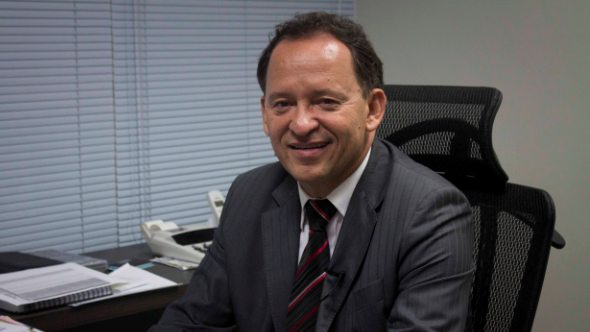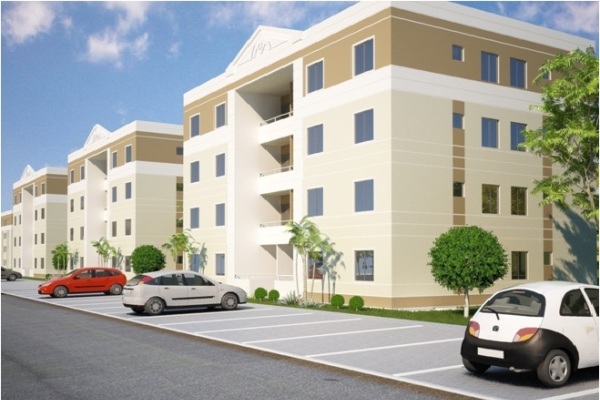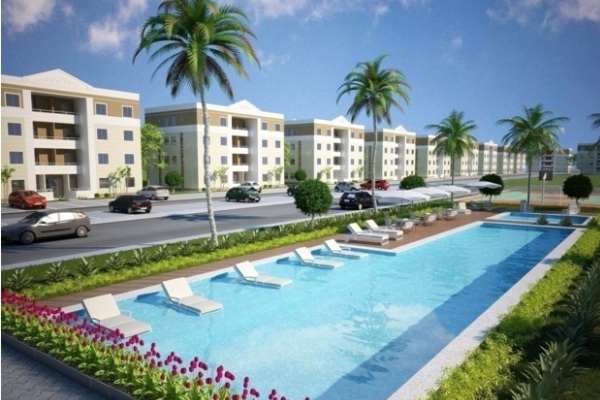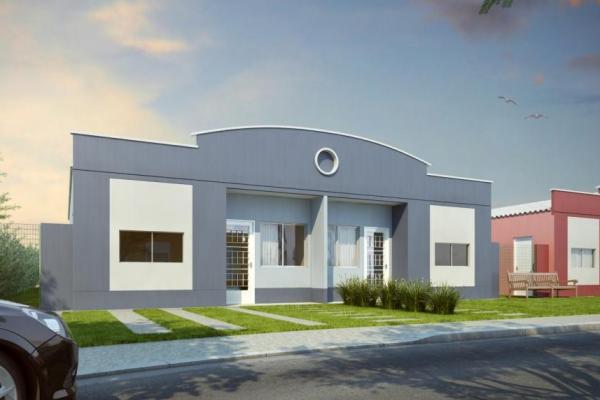Social Imóveis: Real Estate and Investments in Rondônia
Ailton Arthur, Director of Social Imóveis
Ailton Arthur from Social Imóveis talks about real estate in Rondônia, mentioning the characteristics of the sector and discussing investments. He also introduces his company and presents its history, strenghts, challenges and future plans.
Interview with Ailton Arthur, Director of Social Imóveis

Could you give us a general description of Rondônia’s real estate market? Also, what are the main characteristics of the state?
Partnerships are always welcome. We want to welcome national and international investors to Porto Velho, because they bring modernization. There are currently Chinese, Chilean, American and European investors right here in our state, both in the rural and urban areas.
A characteristic of Rondônia and specifically of Porto Velho, is that there is a something that sets us apart from the south of the country. Here we have two seasons, we have winter, which consists of six months of rain and no cold, and we have summer, which is six months of sunshine and temporarily some rain. The land here in Rondônia is very good, very fertile and very productive. In the sixties and the seventies, INCRA (The National Institute of Colonization and Agrarian Reform) created colonies, whereby it divided the state of Rondônia for the people that were arriving here providing an average of 100 hectares for each landowner. The state was divided very well, where some municipalities had huge areas, such as the farmers that have a higher output. Because of this, the capital doesn’t depend on the municipalities from the interior of the state.
In the last few years, Porto Velho has evolved, has gained a real estate market, and has grown almost in an exaggerated sense. We could say that our capital’s real estate market is booming. Where once we had a population of approximately 250 thousand inhabitants, today we are getting to up to about 500 thousand inhabitants. The federal government invested in Rondônia and primarily in the state’s capital city by implementing two hydroelectric plants which has been an investment of 30 billion Brazilian Reais and by hiring about 30,000 labourers. As a consequence of this, we have the following: where there was a church, there now is housing for the labourers; work at motels and hotels has completely changed on a daily basis in Porto Velho; in terms of bakeries and restaurants, there were always extremely long lines and the way that the owners of these establishments dealt with this, in order to reduce the number of clients, was with price increases, so if you ate at a restaurant on the first day of the month you would pay one amount, and then at the end of the month it was another amount and some people noticed that. With all of these financial transactions, the real estate market wasn’t very different, it grew a lot. We’ve had a lot of national and international construction companies here in the capital city; we’ve had investors from the state of Rondônia, from the rest of Brazil and also from the rest of the world. Due to this, there has been a an upright growth of our capital city, in the past we used to deal with houses a lot, today we deal with apartments. Today we have buildings that are 24 stories high in Porto Velho. Apartments appeal to Brazilians in general, since many of them live in apartments, and now the Porto Velhenses and Rondônienses have also adhered to this due to safety, comfort and even tranquility and leisure.

For those of us that live in Porto Velho today, and especially for those people that had no involvement with the real estate sector, it’s been very difficult, because a property that used to cost 100 thousand Brazilian Reais automatically went up to 300-350 thousand Brazilian Reais. Properties that used to cost approximately 400 thousand Brazilian Reais, doubled in price costing up to one million Brazilian Reais or more. This means that the people that work, and that are labourers, had to deal with a lot of challenges. Because of these challenges, national construction companies arrived here and are working with the government project called “Minha Casa, Minha Vida” (My House, My Life) and have built several condominiums and several houses and apartments at a lower cost. These costs have been supported by the municipality, the state and the federal government, making it possible for a person to buy. However, properties in general have gone up in price, when in reality people’s incomes haven’t increased together with these high prices.
What would be your advice to an international investor that would like to invest in the real estate sector here?
The real estate market here in our capital city today has some privileged areas, as much as on the right bank of the Madeira River as well as on the left bank of the Madeira River. I would advise international investors that want to invest in our capital that they start up a different kind of undertaking. Let’s say something with a marina in order to take advantage of all the natural wealth of the river. Our river can be easily navigated, there are ships that make it up here to the capital, arriving from the Amazon River and travelling via the Madeira River. So we need international investors to invest in the state’s capital and also to invest in our forest. We also have a carbon project which today is well recognized at an international level.
Could you introduce Social Imóveis, the company’s history, the key facts and its operation areas?
It’s easy to talk about Social Imóveis, it’s my company that was born here with me 30 years ago. Our capital, Porto Velho, grew very quickly; first in the fifties and sixties, due to the rubber era; then we went on to gold right after in the seventies and eighties; and now there are investments in the hydroelectric power plants which happen to be very large investments. Social Imóveis started out with a staff of about ten real estate agents, and today with all of this growth, I have a team of 110 real estate agents and also ten managers.
In terms of local property management, today I manage about 2,000 properties for rental purposes. In the past when we used to manage 50 properties we were considered a large real estate agency. Today the real estate agency has evolved a lot, and I, with all of my structure as a lawyer, an administrator and a real estate agent having been around for many years, know how to take advantage of the growth of the real estate market. I have several colleagues that did not have the same opportunity and they really got stuck in time. I opened up my company to Brazil and to the world. At an international level, I have done consulting for foreigners. We have worked here with Americans, Europeans, and there are a lot of people that invest in Porto Velho and because of this the real estate agency grew at an exaggerated rate.

I know that one day there is going to be a change and that things are going to adjust, so I am prepared for this. For example, there is a property that costs R$1.1 million today, and I know that this is not the realistic price of it due to all of this sudden growth, so I think that the devaluation in the real estate market will reach around 10-20%. But for the time being, today, our capital and the state of Rondônia are going through a phase of getting better each time. Large companies are investing here in soybeans, we have a lot of gold, and our state is number one in terms of cassiterite in the world (foreigners invest a lot in the cassiterite). I think the international investors need to come here and get to know our cassiterite deposit, our diamond deposit, our gold mines and the Madeira riverbed is guaranteed to contain a lot of gold as well. Of course, there are always some rules that we need to abide by in order to make use of these minerals.
Is Social Imóveis going after any type of partnership, on a national or international scale?
Partnerships are always welcome. We want to welcome national and international investors to Porto Velho, because they bring modernization. They bring what is happening abroad here to Porto Velho. There are currently Chinese, Chilean, American and European investors right here in our state, both in the rural and urban areas. And we do want them to come and make new, modern and beautiful investments in our capital city.
Is Social Imóveis based only in Rondônia? If so, do you have any plans of branching out nationally?
Social Imóveis has been in the Rondônia market for 30 years. We opened up a branch office at the mall, two other branches in two cities in the interior of the state and we’ve also opened up three other branches here in the capital city. We are working on a project of opening up a branch in Manaus sometime this year, in 2013. We intend to do this because we are only an hour away by plane, the real estate market in Manaus is really good, and finally because we want to do what we do here, with all of our knowledge, and create the same thing over there. We basically opened up a real estate agency and brought a registry office into the agency, and also a bank. Today we have the banks: Caixa Econômica Federal, Banco do Brasil, Banco Itaú and Banco Bradesco that deal with financing and loans directly within the company for our clients. I hope that we can grow a lot more this year!
What makes Social Imóveis different from its competition?
Our strengths lie in the quality of our customer service, we respect our clients. We’ve been in the market for 30 years and I always remind my team of real estate agents that we have to bear in mind that we are also buyers and that we have to respect all of the thoughts, attitudes and the way a client presents himself/herself when they are in front of us. We have to show all of the property’s documentation, we have to tell them if the investment is a good deal and that we ourselves could be making that investment, I think this is a fundamental factor. From the moment that you invest, you can safely sell to a client. I always tell my clients when I sell them an apartment, whether I have an apartment in that building and that such and such a unit is mine, and this lets the client invest without any worries about an apartment in that building because I am in that building as well.

What are Social Imóveis’ greatest challenges?
Social Imóveis’ challenge is that it is very bold. We are trying to implement an information system in the real estate sector, an electronic magazine where the client will have access to all of the blueprints, square meters, costs, location and quality of the finish of all of the undertakings. A client will be able to access all of this right from their home, as if he/she was right here in our offices. This is mainly because of heavy traffic, lots of traffic jams and sometimes even due to the little amount of time that clients have. And then there is also the opening of the branch in the state of Amazonas which is something that we would like to do as soon as possible.
How do you envision Social Imóveis in the next 2-3 years?
In the next 2-3 years, I see Social Imóveis as a well consolidated real estate agency, that has grown a lot and rapidly before its time. The tendency now is for us to work with solidity and experience. Each time we see the agency climbing up new steps. We are pursuing the computer information sector, we are pursuing the area of growth in investments in closed condominiums and if possible, if it’s God’s will, I also see Social Imóveis as a construction company which would be a part of a group within the company.
What would be your final message to an investor willing to come to the state of Rondônia?
Rondônia is a state of the future. It’s the Brazilian state that grows the most within Brazil. And those of you who are reading this interview can come here for a visit. I will be at your service to welcome you to the state, here in our capital city, so you can get to know our mineral resources, our many types of timber, that our state is productive in the agricultural sector and that we have a carbon project which is fundamental. Porto Velho has its doors wide open to welcome the investors that would like to invest in businesses around here. I am sure that once you come to Porto Velho you will like it a lot, and that when you invest you will be very happy because the return on your investment will be very good. We have large farms that are about 5,000-10,000 hectares which today cost about R$2,500.00-3,000.00 per hectare and if you transform this into US dollars it will cost about US$1,000.00 per hectare which is not a big amount due to the possibilities of productivity. Also, if you like to invest in soybeans we have a lot of good, flat, fertile lands and we don’t have a lot of mountains and bush and rocks, the land here is very good for the development of soy here in Brazil.